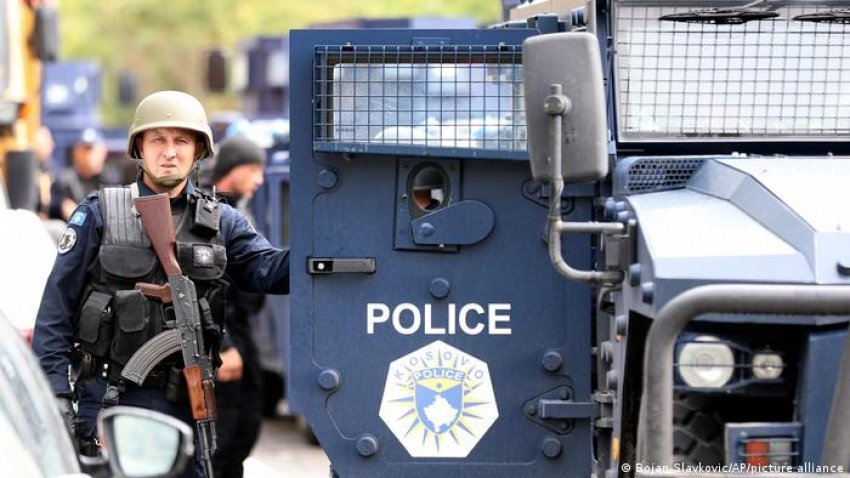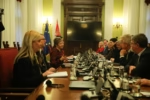Kosovo-Serbia relations continue to be tense.
Serbia has long refused to implement agreements reached with Kosovo and shows no interest in new agreements.
However, the Government of Kosovo is not “sitting idly by”; it is making decisions to extend sovereignty to the northern part of the country, even though it often lacks support from allies.
Recently, the Kosovo Police closed three branches of the Serbian Post in North Mitrovica, three in Leposavić, two in Zvečan, and one in Zubin Potok.
Police officials said they initiated the police action after receiving information from the Regulatory Authority of Electronic and Postal Communications (ARKEP) that unlicensed economic operators were operating on the territory of Kosovo and were not registered with the Business Registration Agency of Kosovo (ARBK).
Although this action was legally correct, it appears to be politically problematic for international actors and Serbia.
Following this police action, there have been increasing voices warning of a possible escalation in the situation and Kosovo-Serbia relations.
“The uncoordinated actions of Kosovo expose Kosovo citizens and KFOR soldiers to great danger, provoke unnecessary escalation of regional tensions, and undermine Kosovo’s reputation as a reliable international partner,” stated the U.S. Embassy in Pristina.
Furthermore, Serbian President Aleksandar Vučić mentioned the possibility of a military conflict.
Security experts spoke to “Bota sot” about the issue, offering their perspectives.
Halimi: Efforts to Establish Order and Legality Across Kosovo Should Be Supported
Speaking to “Bota sot,” Armend Halimi from the Institute for Security Studies (ISS) commented on the situation.
He initially stated that efforts to establish order and law in the north should be supported, both by local political parties and by international actors.
According to him, if these actions were supported, Vučić’s threats would not carry much weight.
“The effort to establish order and legality throughout Kosovo should be supported, first by all political parties and then by the international community. If this were the case, Vučić’s threats might not have been expressed.”
Moreover, he added that through criticism, international actors are legitimizing the Serbian president, making attacks and attempts at conflicts more likely.
“Otherwise, the opposite is true—by criticizing Kosovo, Vučić is being legitimized, and attacks or attempts at conflict are more likely, which should not happen,” Armend Halimi concluded for “Bota sot.”
Gecaj: These Actions by the Government of Kosovo in the North Are Legally Routine
Security expert Hysen Gecaj assessed that these police actions are routine, but because they occur in the north, they may provoke tensions.
He said there could be severe consequences for Kosovo, as international actors do not view this as an appropriate action, and he emphasized the need to find a more suitable moment to resolve this issue.
“These actions by the Government of Kosovo in the north, like in the past, are legally routine, but since the north is a political problem, the intervention in closing the illegal posts there will cause severe political consequences for Kosovo in its relations with the QUINT states. These consequences are certainly due to the international perspective, especially that of the U.S., which is deeply concerned about the deterioration of security in this part of Europe, where maintaining peace is essential, even if it is a temporary calm until a more suitable moment to resolve it definitively,” noted the expert.
Gecaj also called on the Government of Kosovo to seek the full implementation of the agreement with Serbia and not to raise issues piecemeal, as this could lead to escalations.
He called for coordination and cooperation with international actors.
“In the eyes of the international community, the U.S., and other QUINT states, Kosovo is portraying itself as an unreliable state, one that cannot be trusted since the project of Kosovo as a state is also the merit of these major powers. Therefore, unilateral actions by the Government of Kosovo not only send a message of distrust but also portray Kosovo as a threat to the Serbian minority in the north. This is because the Government of Kosovo and that of Serbia have an agreement accepted by both parties, which includes issues like the Ibar Bridge and the matter of posts, banks, etc. Instead of insisting on the full implementation of the entire agreement, the Government of Kosovo is selectively addressing issues, thereby increasing the number of topics that carry greater risk of failure and local conflicts. These conflicts present a problem for the U.S. and the West in general, as they are aware of KFOR’s mandate and the consequences for NATO in the event of a conflict,” he elaborated.
Finally, the expert added that there is a risk of a new conflict between Kosovo and Serbia, especially considering the fragile global security situation, with several wars ongoing, such as in Ukraine.
He also highlighted Serbia’s ties with Russia and the latter’s attempts to instigate a new conflict in the Balkans.
Given this, he characterized international reactions to the Kosovo government’s latest decision as very serious.
“This action by the Government of Kosovo at this sensitive time for global security is, whether consciously or not, paving the way for a conflict between Kosovo and Serbia, which is already under significant Russian pressure to open a new front in the Illyrian Peninsula, to divert attention from the war in Ukraine. I do not believe Serbia is ready for a war front, despite Russian pressure to do so. However, Serbia, as a Russian ally in such circumstances, could take steps toward a controlled and limited conflict by the Serbian Government. Even a conflict of this level is problematic for NATO in the troubled region, hence the QUINT states’ response against the action of the Kosovo Government, especially the serious reaction from the U.S. Ambassador. From an international perspective, analyzing the risks to security and the weight of the Albanian-Serbian conflict, a conflict that is not a priority for powerful states, any hasty and unmeasured action by the Government of Kosovo produces consequences for Kosovo, as the worst-case scenarios occur within the territory of Kosovo, with the main actor being the Government of Kosovo,” concluded Hysen Gecaj for “Bota sot.”







